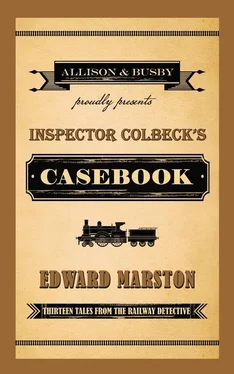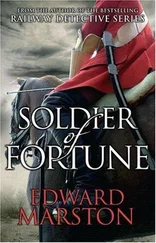Edward Marston - Inspector Colbeck's Casebook
Здесь есть возможность читать онлайн «Edward Marston - Inspector Colbeck's Casebook» весь текст электронной книги совершенно бесплатно (целиком полную версию без сокращений). В некоторых случаях можно слушать аудио, скачать через торрент в формате fb2 и присутствует краткое содержание. Год выпуска: 2014, ISBN: 2014, Издательство: Allison & Busby, Жанр: Исторический детектив, на английском языке. Описание произведения, (предисловие) а так же отзывы посетителей доступны на портале библиотеки ЛибКат.
- Название:Inspector Colbeck's Casebook
- Автор:
- Издательство:Allison & Busby
- Жанр:
- Год:2014
- ISBN:9780749014742
- Рейтинг книги:4 / 5. Голосов: 1
-
Избранное:Добавить в избранное
- Отзывы:
-
Ваша оценка:
- 80
- 1
- 2
- 3
- 4
- 5
Inspector Colbeck's Casebook: краткое содержание, описание и аннотация
Предлагаем к чтению аннотацию, описание, краткое содержание или предисловие (зависит от того, что написал сам автор книги «Inspector Colbeck's Casebook»). Если вы не нашли необходимую информацию о книге — напишите в комментариях, мы постараемся отыскать её.
Inspector Colbeck's Casebook — читать онлайн бесплатно полную книгу (весь текст) целиком
Ниже представлен текст книги, разбитый по страницам. Система сохранения места последней прочитанной страницы, позволяет с удобством читать онлайн бесплатно книгу «Inspector Colbeck's Casebook», без необходимости каждый раз заново искать на чём Вы остановились. Поставьте закладку, и сможете в любой момент перейти на страницу, на которой закончили чтение.
Интервал:
Закладка:
‘We intend no harm to you, Miss Lind,’ she said, softly, ‘but it was an opportunity we could not afford to miss. My name is Eleanor Whittingham and this,’ she added, indicating the man who’d brought her into the house, ‘is my father, Caspar. He’s a composer and your most fervent admirer.’
Caspar Whittingham tried to offer a respectful bow but the effort taxed him and he staggered slightly. His daughter rushed to assist him, helping him across to the piano stool. He lowered himself onto it with a mixture of care and anticipatory pleasure. Feeling less threatened, Jenny was able to take stock of her surroundings and to look more closely at her hosts. Eleanor was a pleasant, fresh-faced woman in her late twenties who exuded a sense of good health. Caspar, by contrast, was clearly a sick man, wasted by some sort of disease and haunted by the prospect of death. In feeling sorry for him, Jenny lost any concern for her own safety. Neither the father nor the daughter posed any physical threat to her.
‘They’re all here,’ said Whittingham, pointing to the programmes. ‘I saw every opera in which you appeared in this country and attended every concert. You are inimitable, Miss Lind. When I last heard you sing, I was blessed with the chance to secure your autograph. Show it to her, Eleanor.’
Taking the programme from the piano, his daughter passed it to Jenny.
‘We’d have preferred to invite you here,’ continued Whittingham, ‘but there would have been no hope of your coming. Eleanor is a soprano and I am a composer but neither of us could ever ascend to the heights that you and your husband have reached. We are mere apprentices while you are masters of music.’
‘My father is being characteristically modest,’ said Eleanor with a fond smile. ‘He is no apprentice but a fine musician and a gifted composer. His greatest wish is that Jenny Lind would get to sing one of his songs.’
‘Then why not send it to me?’ asked Jenny. ‘I’d have considered it.’
‘You must get deluged with songs,’ said Whittingham, sadly. ‘Everyone who can compose a tune wants it sung by you. Preference is bound to go to operatic arias and favourite airs. Also, of course, you are married to a composer who can write songs for you.’
Jenny was beginning to understand why she was there. It was not a whim of an eccentric gentleman. It was a final opportunity for someone with only a short time to live. Whittingham was ravaged by illness. What had kept him alive, in part, was the overwhelming desire to hear her sing in private. Cost meant nothing to him. He was obviously a wealthy man. Nor did fear of consequences hold him back. He and his daughter were ready to brave the strictures of the law if they could achieve their objective. Whittingham would never live long enough to suffer imprisonment. Jenny was there to sing his requiem.
‘We can’t apologise enough for what happened,’ said Eleanor with a hand on her father’s shoulder. ‘We took great care that you were not hurt in any way. You must be very angry with us. Who would not be in your position? If you feel that we have abused you too much, you are free to leave at once. We can summon a cab.’
Wanting to accept the offer, Jenny somehow held back. She was confused. It had been very wrong of them to kidnap and frighten her in the way that they did. Part of her wanted them both punished along with their many accomplices. They had put her through a chilling ordeal. But another part of her urged clemency. She was there at the behest of a dying man with a last frail wish. Eleanor and Whittingham were musicians, dedicated to their art. They inhabited the same world as Jenny. Nothing mattered more to them than music. They were kindred spirits.
‘Play one of your songs,’ she told the composer. ‘Eleanor can sing it.’
Pursuit began with a series of false starts. Colbeck and Leeming raced around the city in a cab that called at four addresses in vain. They were turned away empty-handed each time. The fifth address took them to the leafy district of Edgbaston.
‘Look at the size of some of these places,’ said Leeming, marvelling at them. ‘They’re ten times bigger than our little house.’
‘I did sense that the kidnapper was not short of money.’
‘Does he know what the sentence is for abducting someone?’
‘I doubt it, Victor, but he’ll soon find out.’
‘I do hope we’re on the right track at last.’
‘I’m sure we are,’ said Colbeck as they turned into a wide road lined with trees. ‘I can almost feel that we’re getting closer.’
Halfway down the road, the cab rolled to a halt and the detectives got out. Colbeck asked the driver to wait then led the way up the drive. Its dimensions might be striking but the mansion had an air of neglect. Slates were missing on the roof, walls were overgrown with ivy and chunks of plaster had come off the pillars supporting the portico.
‘Go round the back,’ said Colbeck.
‘Yes, sir.’
‘But don’t try to get into the house. We mustn’t frighten them into impulsive action. People can get hurt that way.’
‘We don’t even know if it’s the right place, sir.’
‘Oh, it’s the right place. I’m certain of it.’
Waiting until Leeming had gone, Colbeck went to the front door and rang the bell. There was a long delay before it was opened by a young man with an impassive face. Colbeck introduced himself and asked if he might see Caspar Whittingham.
‘The master is away at the moment,’ said the servant, crisply.
‘Is any other member of the family here?’
‘I’m afraid not, Inspector.’
‘When will Mr Whittingham return?’
‘I can’t answer that question. He told me that they might be away for a day or two. Would you like to leave a message?’
Colbeck knew that he was lying. The man’s voice was calm but his eyes gave him away. He kept blinking. Evidently, he was obeying his master’s orders and pretending that he was not there. Colbeck removed his hat and stepped forward.
‘In that case, I’ll wait until he returns.’
He servant was flustered. ‘You can’t come in,’ he protested.
‘I can acquire a search warrant, if you prefer.’
‘Look, Inspector, I give you my word that nobody from the family is here.’
Hand on his hat, Leeming came running around to the front of the house.
‘You’ll never guess what I just saw, sir,’ he said.
‘I fancy that you saw Mr Caspar Whittingham,’ suggested Colbeck.
‘Is that his name? He was playing the piano and someone was singing to him. I couldn’t believe my eyes,’ he said with a hollow laugh. ‘It was Jenny Lind.’
Colbeck swung round to confront the servant. ‘Are you still going to insist that nobody is at home?’
The man wilted visibly.
When his wife was returned unharmed to him, Goldschmidt showered the detectives with apologies for doubting them. He was sorry for his earlier harsh criticism of them and promised to write to the superintendent in praise of them. Rosen’s apology was delivered with reluctance until he realised that the concert would go ahead, after all. He was so excited that he thrust a grateful cigar at each of the detectives. After the initial horror of being kidnapped, Jenny had become reconciled to what was a heartfelt plea from Caspar Whittingham. His songs had definite merit though not enough to tempt her to include any of them in her programme that evening. Jenny declined to press charges against him or his daughter. She preferred to dismiss the whole thing as a rather bizarre adventure.
From the point of view of the detectives, their reputation had been vindicated. What pleased them most was that they were given free tickets to attend the concert at Town Hall, an imposing neoclassical structure at the heart of the city. Leeming was astonished when Colbeck told him that Joseph Hansom, the man who’d designed it, had also given his name to the cab that took them there. Resplendent in their finest attire, the concert-goers of Birmingham came in large numbers and there was a buzz of excitement. When Jenny Lind first appeared onstage, the ovation went on for minutes. The performance was a continuous source of pleasure for Colbeck but for Victor Leeming it was a revelation. Jenny Lind’s voice held him spellbound. He had never heard anything so melodious and yet so apparently effortless. When the first half of the concert ended, he clapped as enthusiastically as anyone.
Читать дальшеИнтервал:
Закладка:
Похожие книги на «Inspector Colbeck's Casebook»
Представляем Вашему вниманию похожие книги на «Inspector Colbeck's Casebook» списком для выбора. Мы отобрали схожую по названию и смыслу литературу в надежде предоставить читателям больше вариантов отыскать новые, интересные, ещё непрочитанные произведения.
Обсуждение, отзывы о книге «Inspector Colbeck's Casebook» и просто собственные мнения читателей. Оставьте ваши комментарии, напишите, что Вы думаете о произведении, его смысле или главных героях. Укажите что конкретно понравилось, а что нет, и почему Вы так считаете.












